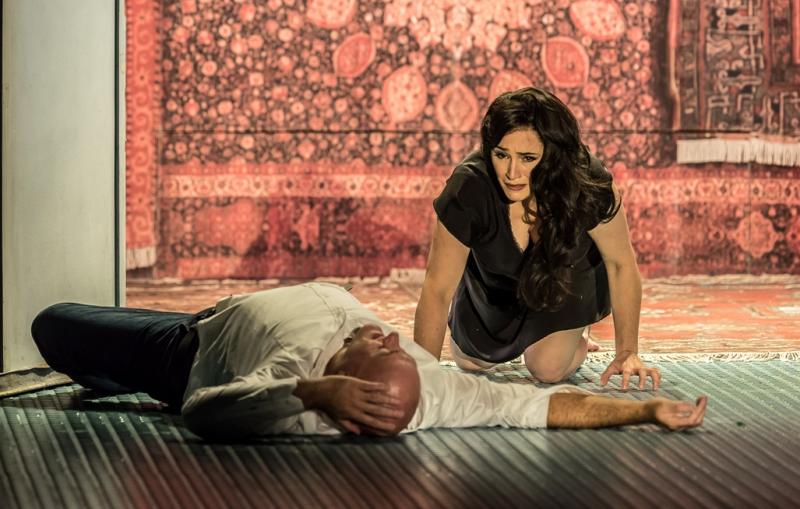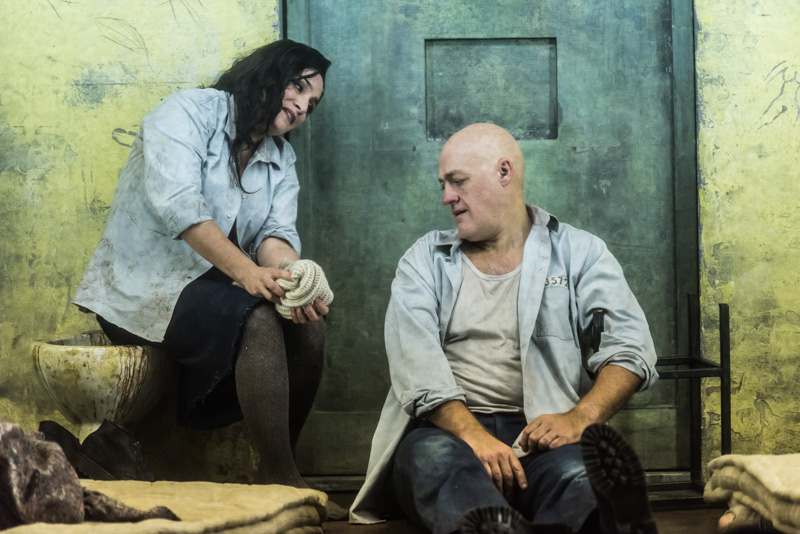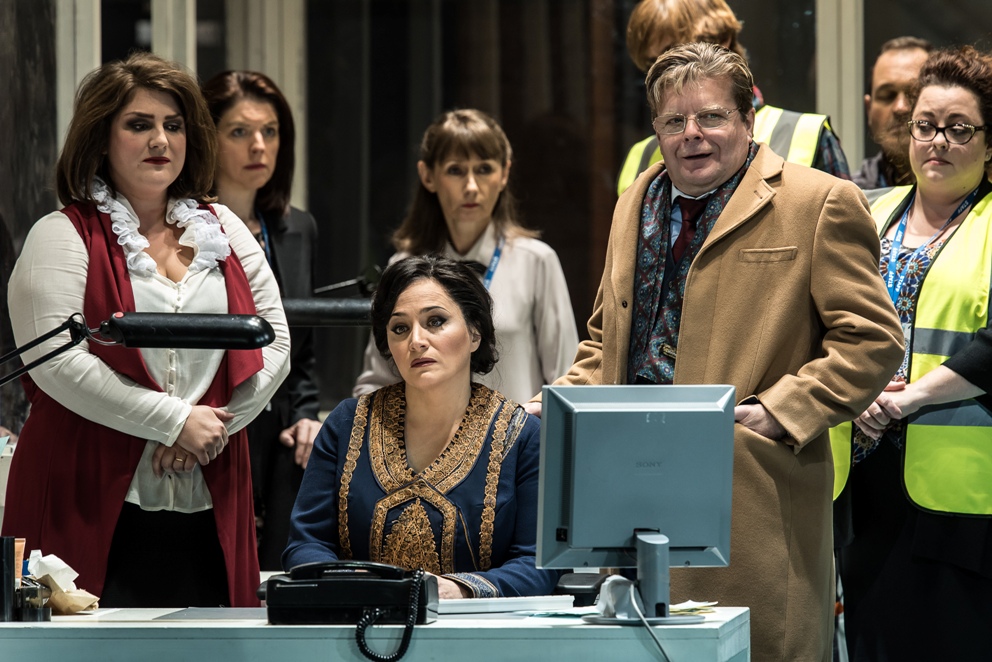Lady Macbeth of Mtsensk, English National Opera | reviews, news & interviews
Lady Macbeth of Mtsensk, English National Opera
Lady Macbeth of Mtsensk, English National Opera
Searing music drama from soprano, director and conductor for ENO's new era

“The music quacks, hoots, pants and gasps”: whichever of his Pravda scribes Stalin commandeered to demolish Shostakovich’s “tragedy-satire” in January 1936, two years into its wildly successful stage history, didn’t mean that as a compliment, but it defines one extreme of the ENO Orchestra’s stupendous playing under its new Music Director Mark Wigglesworth. On the other hand there are also heartbreaking tenderness, terrifying whispers and aching sensuousness.
Lady Macbeth of Mtsensk was a masterly choice to usher in the new era of a company which conductor Edward Gardner has left in peerless artistic shape (he returns to conduct Tristan and Isolde next summer). Wigglesworth made a stunning impact in a 2001 ENO revival of David Pountney’s flagship production with its red policemen and frantic activity. Tcherniakov’s, first seen in Dusseldorf seven years ago but apparently rethought “as new”, couldn’t be more different: where Pountney’s vision was often caricatural and busy to the point of overload, this Lady Macbeth is outwardly poised, though not static, and stylized when violence erupts, ruthlessly symmetrical in a way that only our own Richard Jones can achieve, and unpredictable so that the last act comes as a real shock (probably it’s as well that no production images were available of this scene).
 Tcherniakov’s Katerina Izmailova, the merchant’s wife who murders for passion but also reacts to oppression and brutality, is no feminist icon. The way she’s made to kneel at her husband’s feet in a replay of the scene in Ostrovsky’s The Storm - set to music by Janáček as Katya Kabanova, a very different role Racette has already played at ENO to perfection – gets mirrored for real in her abasement before the dominant presence of John Daszak’s compelling worker Sergei: the Magdalen who washes her wounded lover after his flogging to the music of Shostakovich’s shattering Passacaglia – never more intense than here, a great fusion between sound and vision – becomes a slave to love, a mare mounted by her stallion (as one of the libretto's many animal images puts it).
Tcherniakov’s Katerina Izmailova, the merchant’s wife who murders for passion but also reacts to oppression and brutality, is no feminist icon. The way she’s made to kneel at her husband’s feet in a replay of the scene in Ostrovsky’s The Storm - set to music by Janáček as Katya Kabanova, a very different role Racette has already played at ENO to perfection – gets mirrored for real in her abasement before the dominant presence of John Daszak’s compelling worker Sergei: the Magdalen who washes her wounded lover after his flogging to the music of Shostakovich’s shattering Passacaglia – never more intense than here, a great fusion between sound and vision – becomes a slave to love, a mare mounted by her stallion (as one of the libretto's many animal images puts it).
Racette (pictured above right) is compelling from the start, motionless in a box room of orange oriental carpets while factory life goes on around her, crumpling and seething in passion – but still with very measured physical movements – and ending up rocking in a filthy prison cell, the very image of extreme torment (the steppes on the way to Siberia are suggested only by an encompassing black through which Matthew Best’s Old Convict and the chorus project). The bright voice can spread under pressure, but whose wouldn’t in Shostakovich’s insanely taxing and harsh vocal writing? I also wonder, incidentally, if the original Russian text fits as awkwardly as David Pountney's English version, created from a rough translation; maybe it was time for a new one.
This Katerina keeps her dignity and delivers her proto-feminist manifesto to the depraved workers with superb aplomb; the passion, which comes quickly when it comes, is charted through careful illustration of Shostakovich’s magnificently various interludes. The denouement is as haunting to perfection as was that of Katarina Dalayman’s Katerina in Richard Jones’s equally unconventional Royal Opera production (pictured below: Racette and Daszak in the final scene). There’s a shocking attempted suicide, and a double murder which is very far from what Shostakovich imagined, but of unparalleled bleakness and horror.
The men, of course, are all shits. While we want more of the splendid Peter Hoare’s caricatural husband - Shostakovich gives him little music to sing - Robert Hayward needs a bit more bass heart-of-darkness as disgusting father-in law Boris Izmailov. Daszak’s clarion Sergey makes us hate him at the end even more than usual, though the disgust is motivated by the fact that when the Chief of Police (a true bass, Per Bach Nissen) comes to arrest the murderers at their wedding, his preparation to offer a massive bribe is forestalled by Katerina’s confession. There are spot-on characterisations of debased women by Rosie Aldridge (pictured below on the left with Racette and Hoare) as a worker who’s come to expect her abuse and Clare Presland, with tones reminiscent of Sally Burgess who also, if memory serves, played the role of the convict Sonyetka. The chorus is, as throughout last season, tirelessly impressive.
 There’s nothing in Tcherniakov’s distressing drama or Gleb Filshtinsky’s choreographic lighting which doesn’t match Wigglesworth’s vision. And a conductor could go no further in eliciting from his players six pianos or five fortes, a noise so loud it set me on the brink of tears with sheer terror. Solos, from first violin down to contrabassoon, manage to sound unlike the instruments in question, which is a compliment. The extra brass in the boxes, one slight out-of-synch on the first night apart, are resplendently awful.
There’s nothing in Tcherniakov’s distressing drama or Gleb Filshtinsky’s choreographic lighting which doesn’t match Wigglesworth’s vision. And a conductor could go no further in eliciting from his players six pianos or five fortes, a noise so loud it set me on the brink of tears with sheer terror. Solos, from first violin down to contrabassoon, manage to sound unlike the instruments in question, which is a compliment. The extra brass in the boxes, one slight out-of-synch on the first night apart, are resplendently awful.
In his quest for extreme symphonic illumination and depth, Wigglesworth may set himself and the singers challenges of co-ordination – a lighter-sprung style would be easier for those on stage to follow – but correspondences between stage and pit should sharpen up as the run progresses. Compassion is almost drowned out by disgust – there must have been a serious sado-masochistic streak in Shostakovich – yet ultimately triumphs. It’s not a comfortable evening at any point, but this is exactly what great music-theatre should be doing.
- Lady Macbeth of Mtsensk at ENO until 20 October
- From tomorrow (28 September), David Nice devotes five two-hour sessions of his Opera in Depth classes at the Frontline Club to Lady Macbeth of Mtsensk. Mark Wigglesworth visits to discuss both this and The Force of Destiny on 2 November. Further details on David's blog
rating
Share this article
Add comment
The future of Arts Journalism
You can stop theartsdesk.com closing!
We urgently need financing to survive. Our fundraising drive has thus far raised £49,000 but we need to reach £100,000 or we will be forced to close. Please contribute here: https://gofund.me/c3f6033d
And if you can forward this information to anyone who might assist, we’d be grateful.

Subscribe to theartsdesk.com
Thank you for continuing to read our work on theartsdesk.com. For unlimited access to every article in its entirety, including our archive of more than 15,000 pieces, we're asking for £5 per month or £40 per year. We feel it's a very good deal, and hope you do too.
To take a subscription now simply click here.
And if you're looking for that extra gift for a friend or family member, why not treat them to a theartsdesk.com gift subscription?
more Opera
 La bohème, Opera North review - still young at 32
Love and separation, ecstasy and heartbreak, in masterfully updated Puccini
La bohème, Opera North review - still young at 32
Love and separation, ecstasy and heartbreak, in masterfully updated Puccini
 Albert Herring, English National Opera review - a great comedy with depths fully realised
Britten’s delight was never made for the Coliseum, but it works on its first outing there
Albert Herring, English National Opera review - a great comedy with depths fully realised
Britten’s delight was never made for the Coliseum, but it works on its first outing there
 Carmen, English National Opera review - not quite dangerous
Hopes for Niamh O’Sullivan only partly fulfilled, though much good singing throughout
Carmen, English National Opera review - not quite dangerous
Hopes for Niamh O’Sullivan only partly fulfilled, though much good singing throughout
 Giustino, Linbury Theatre review - a stylish account of a slight opera
Gods, mortals and monsters do battle in Handel's charming drama
Giustino, Linbury Theatre review - a stylish account of a slight opera
Gods, mortals and monsters do battle in Handel's charming drama
 Susanna, Opera North review - hybrid staging of a Handel oratorio
Dance and signing complement outstanding singing in a story of virtue rewarded
Susanna, Opera North review - hybrid staging of a Handel oratorio
Dance and signing complement outstanding singing in a story of virtue rewarded
 Ariodante, Opéra Garnier, Paris review - a blast of Baroque beauty
A near-perfect night at the opera
Ariodante, Opéra Garnier, Paris review - a blast of Baroque beauty
A near-perfect night at the opera
 Cinderella/La Cenerentola, English National Opera review - the truth behind the tinsel
Appealing performances cut through hyperactive stagecraft
Cinderella/La Cenerentola, English National Opera review - the truth behind the tinsel
Appealing performances cut through hyperactive stagecraft
 Tosca, Royal Opera review - Ailyn Pérez steps in as the most vivid of divas
Jakub Hrůša’s multicoloured Puccini last night found a soprano to match
Tosca, Royal Opera review - Ailyn Pérez steps in as the most vivid of divas
Jakub Hrůša’s multicoloured Puccini last night found a soprano to match
 Tosca, Welsh National Opera review - a great company reduced to brilliance
The old warhorse made special by the basics
Tosca, Welsh National Opera review - a great company reduced to brilliance
The old warhorse made special by the basics
 BBC Proms: The Marriage of Figaro, Glyndebourne Festival review - merriment and menace
Strong Proms transfer for a robust and affecting show
BBC Proms: The Marriage of Figaro, Glyndebourne Festival review - merriment and menace
Strong Proms transfer for a robust and affecting show
 BBC Proms: Suor Angelica, LSO, Pappano review - earthly passion, heavenly grief
A Sister to remember blesses Puccini's convent tragedy
BBC Proms: Suor Angelica, LSO, Pappano review - earthly passion, heavenly grief
A Sister to remember blesses Puccini's convent tragedy
 Orpheus and Eurydice, Opera Queensland/SCO, Edinburgh International Festival 2025 review - dazzling, but distracting
Eye-popping acrobatics don’t always assist in Gluck’s quest for operatic truth
Orpheus and Eurydice, Opera Queensland/SCO, Edinburgh International Festival 2025 review - dazzling, but distracting
Eye-popping acrobatics don’t always assist in Gluck’s quest for operatic truth

Comments
A fabulous opening night - as
We saw it last night and
I agree - too uncomfortable
You might just as well be
You might just as well be referring to the drama as Shostakovich sees it (maybe you are, but I hope you went back after the interval). Actually it's worth noting that, far from being 'gratuitous', Tcherniakov doesn't illustrate the 'pornophony' of the first sex scene other than by a swinging lightbulb; Jones went perhaps too much for jokiness and had a dancing wardrobe with the rutting couple behind or in it, I forget which.
The final scene remains the most controversial, but to those who object to the lack of an obviously external Siberian setting, I suggest they read the Leskov novella, where Katerina shares a cell with Sonyetka, and that cell could well be 'en route' as well.